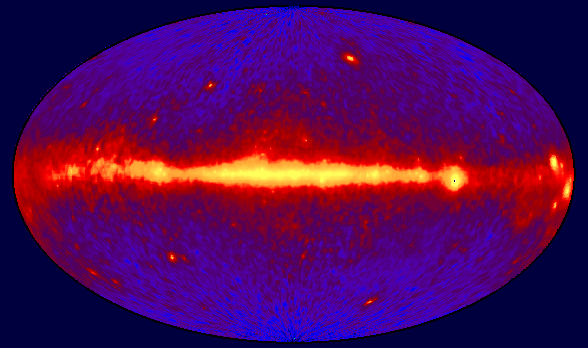Explanation: What if you could "see" gamma rays? If you could, the sky would seem to be filled with a shimmering high-energy glow from the most exotic and mysterious objects in the Universe. In the early 1990s NASA's orbiting Compton Observatory, produced this premier vista of the entire sky in gamma rays - photons with more than 40 million times the energy of visible light. The diffuse gamma-ray glow from the plane of our Milky Way Galaxy runs horizontally through the false color image. The brightest spots in the galactic plane (right of center) are pulsars - spinning magnetized neutron stars formed in the violent crucibles of stellar explosions. Above and below the plane, quasars, believed to be powered by supermassive black holes, produce gamma-ray beacons at the edges of the universe. The nature of many of the fainter sources remains unknown.
1999 2000 2001 2002 2003 2004 2005 2006 2007 2008 2009 2010 2011 2012 2013 2014 2015 2016 2017 2018 2019 2020 2021 2022 2023 2024 2025 |
Yanvar' Fevral' Mart Aprel' Mai Iyun' Iyul' Avgust Sentyabr' Oktyabr' Noyabr' Dekabr' |
NASA Web Site Statements, Warnings, and Disclaimers
NASA Official: Jay Norris. Specific rights apply.
A service of: LHEA at NASA / GSFC
& Michigan Tech. U.
|
Publikacii s klyuchevymi slovami:
pulsar - quasar - gamma ray - gamma-izluchenie - Pul'sar - kvazary - kosmicheskaya observatoriya im. Komptona - ploskost' Galaktiki
Publikacii so slovami: pulsar - quasar - gamma ray - gamma-izluchenie - Pul'sar - kvazary - kosmicheskaya observatoriya im. Komptona - ploskost' Galaktiki | |
Sm. takzhe:
Vse publikacii na tu zhe temu >> | |
